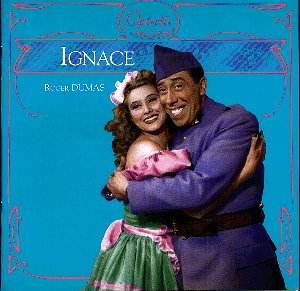Little is recorded
about this composer. Roger Dumas,
born in Salindres in 1897, comes from
the Gard district in southern France.
He was sent to the Conservatory in Nîmes,
where he was such a brilliant pupil
that well before adulthood he was transferred
to the Grande Conservatoire in Paris.
He later became a successful teacher
at the Toulon Conservatoire where he
began to write songs.
There was a Casino
in Toulon where light vocal works were
performed, and where he became the titular
conductor, soaking up every treasure
of a music form that rarely takes itself
seriously. In 1924, in Toulon he presented
his first operetta, Flouette.
This little piece attracted the attention
of film producers and he went on to
receive commissions for film scores,
among them Marine Blue. But he
later returned to operetta with Ignace
(1935), The Casino Dancer (1937),
The Picture Hunters (1947) and
Oscar (1949). He was only 55
when he died in Paris on June 15, 1951
due to an illness that he concealed.
With a book and lyrics
by Jean Manse, Ignace
was first produced at the Théâtre
de Variéties in Marseilles in
1935 and with instant success was quickly
transferred to Paris. The city's première
took place at the Théâtre
Lyrique National. It had Fernandel in
the cast alongside Alice Tissot and
Simone Rouvrière. Dumas was Fernandel's
accompanist and Fernandel's brother-in-law
was Ignace's librettist.
For a year it was a
solid hit in Paris before embarking
on a provincial tour. Within two years,
a film of Ignace was released
and contributed to the fame of Fernandel,
one of France's most original comedy
artists. During a revival (1948) at
the Etoile Théâtre with
Fernandel as Ignace, Sabine André
and Irène Hilda, the composer
added two divertissements to the original
score and re-shaped the piece from three
to two acts.
The Plot: In a garrison
town of the 1930s, Colonel Romuald Durozier,
a man of dignity, loses his when he
sees Loulette, a ravishingly beautiful
actress and cast-off of Baron Gidéon
des Orfraies, or Chouchouille, as she
has nicknamed him. The Colonel's wife
has the character of a shopgirl. The
Baron, a hypocrite and scoundrel of
a man, pays her court in private. Monique,
an 18 year old beauty and the daughter
of the "father of the Regiment", is
in love with a dashing young lawyer
named Serge de Montroc. There is also
the maid, Annette, who enjoys looking
after the colonel's young officers,
amongst whom we find Ignace Boitaclou,
a recent recruit, who witnesses the
plots, muddles and intrigues whilst
behaving as everyone's confidant. Comic
and sentimental songs, duets and choruses
punctuate the goings-on. In short, it
is a military musical with little subtlety
but much good fun: it is entertaining
and ends happily.
This 1967 recording
must have captured one of the last performances
by Fernandel. He was long past his best,
but the resulting recording is of nostalgic
interest all the same. My only real
reservation is that he is present in
so many of the Act II and Act III tracks
where a stronger sense of musicality
would have been beneficial. Elaine Thibault
comes across with a somewhat brittle
voice when singing forte in 'Un mari'
(tr.2) yet sounds extremely good
and pleasantly velvety in her duet with
Robert Piquet (tr.4). Eliane Varon conveys
charm and comes across as attractively
mischievous, which is ideal for the
part.
Not really an operetta,
Ignace is much more a series
of revue numbers linked by dialogue.
The music carries a strong rhythm and
is of the easy going, easy listening
variety and within one of the numbers
I even felt I recognised the Chitty
Chitty Bang Bang theme.
Brief notes in French
are provided in the attractive card
case.
Raymond Walker
Operette
series from Universal Accord reviewed
by Ray Walker
